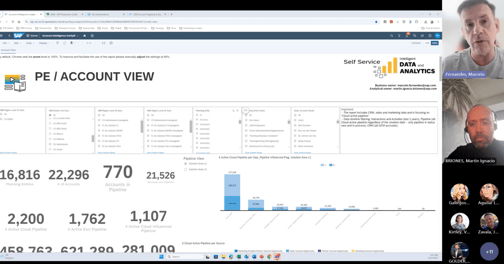The Importance of Data-Driven Decisions in B2B Marketing
In today's digital world, where information circulates at great speed and customer expectations are increasingly complex, B2B (business-to-business) marketing needs to adapt to a highly competitive and dynamic environment.
MARKETINGESTRATÉGIA


In today's digital world, where information circulates at great speed and customer expectations are increasingly complex, B2B (business-to-business) marketing needs to adapt to a highly competitive and dynamic environment.
One of the most effective ways to ensure more accurate decisions and more assertive strategies is through the use of data. Data-driven decisions in B2B marketing are not just a trend, but a necessity for companies seeking efficiency, personalization and competitive advantage.
Why should we use data in B2B marketing?
Using data in B2B marketing allows for a deeper understanding of customer behavior and needs.
By collecting and analyzing data from multiple sources, such as online interactions, past sales, social media, and customer feedback, marketers can segment and target their campaigns more effectively. This results in greater personalization, which in turn increases the relevance of messages and improves conversion rates.
Additionally, data enables marketers to monitor campaign performance in real time and adjust strategies based on results. Rather than relying on guesswork or passive experience, data-driven decisions help minimize risk and optimize marketing investments.
Challenges in using data in B2B marketing
Despite its numerous advantages, adopting a data-driven approach presents significant challenges.
The first is collecting and integrating data from different sources. B2B companies often deal with data that is scattered across different systems, such as CRMs, marketing automation platforms, and social media platforms, making it difficult to get a holistic view of the customer.
Another challenge is data quality. Outdated or inaccurate data can lead to poor decision-making and harm campaign performance.
Investing in the right technology to ensure data cleanliness and integrity is essential. In addition, empowering teams to interpret and apply data strategically is also a critical factor for success.
How does data generate competitive advantage?
Companies that use data strategically are able to generate deeper insights and make more informed decisions.
In B2B marketing, this can translate into better understanding customer needs, identifying emerging trends, personalizing at scale, and anticipating market demands.
Predictive analytics, for example, allows companies to predict future behaviors and adjust their strategies proactively, rather than reactively. This creates a significant competitive advantage, as companies that act more quickly and assertively can outperform competitors that still rely on traditional approaches.
Additionally, by making data-driven decisions, B2B companies can increase the efficiency of their marketing efforts.
By identifying the most effective channels and strategies, you can optimize your marketing budget, directing resources to initiatives that offer the highest return on investment (ROI). This not only improves campaign results, but also helps build a stronger, more trustworthy brand in the market.
Conclusion: Suggested Actions to Leverage Data in B2B Marketing
Invest in data collection and analysis technology : Adopt CRM, marketing automation, and data analytics tools to integrate information from different sources and obtain a unified view of the customer.
Ensure data quality : Implement data cleaning and validation processes to ensure data is accurate and up-to-date, avoiding erroneous decisions.
Train your team to interpret data : Empower marketers to understand and apply data-driven insights, turning numbers into strategic actions.
Use predictive analytics to anticipate trends : Use analytical models to predict customer behavior and proactively adjust campaigns, optimizing strategies before problems arise.
Personalize campaigns at scale : Segment your audience based on data and create targeted messages, increasing relevance and conversion rates.
Optimize your marketing budget : Direct resources to the channels and strategies that offer the highest return on investment, maximizing the efficiency of your campaigns.
Monitor results in real time : Monitor campaign performance constantly, making quick adjustments to improve results and maximize the effectiveness of your marketing actions.
Following these practices will help B2B companies make more informed decisions, improve customer experience, and ultimately gain a competitive edge in the marketplace.
See more articles
Featured Articles
Continue reading about B2B marketing


